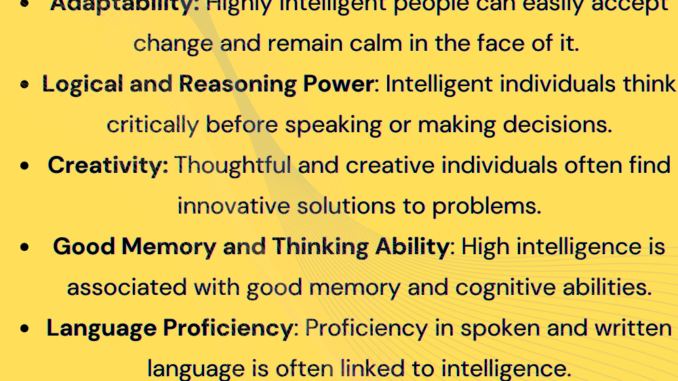
Signs of an Intelligent Person: A Deep Dive
Intelligence is a multifaceted construct, encompassing a wide range of cognitive abilities and skills. While traditional measures like IQ have long been used to assess intelligence, a more holistic view recognizes the diverse ways intelligence manifests. Let’s explore some key signs of an intelligent person.
A. Signs of an Intelligent Person
1. Advanced Language and Communication Abilities
Intelligent individuals often possess exceptional language skills. They can articulate complex ideas clearly and concisely, demonstrating a rich vocabulary and command of grammar. They are adept at persuasive communication, tailoring their message to different audiences. Moreover, they are typically skilled listeners, able to comprehend and respond thoughtfully to others’ ideas.
2. Strong Memory and Learning Capabilities
A sharp memory is often associated with intelligence. Intelligent people can quickly absorb and retain information, enabling them to learn new skills efficiently. They also exhibit effective learning strategies, such as organizing information, making connections, and practicing regularly.
3. Exceptional Problem-Solving Skills
Intelligent individuals excel at problem-solving. They can analyze complex situations, identify underlying issues, and develop creative solutions. They are adaptable and open to different perspectives, allowing them to approach challenges from multiple angles.
4. High Emotional and Social Intelligence
Contrary to popular belief, intelligence extends beyond cognitive abilities. Emotionally intelligent people can understand and manage their own emotions, as well as empathize with others. They build strong relationships, resolve conflicts effectively, and demonstrate social competence.
5. Curiosity and a Passion for Learning
Intellectual curiosity is a hallmark of intelligent individuals. They possess a thirst for knowledge and a desire to explore new ideas. They are lifelong learners, continuously seeking to expand their understanding of the world.
B. Five Signs of a Highly Intelligent Person
1. Quick Learning and Adaptability
Highly intelligent people are quick learners. They can grasp new concepts rapidly and adapt to changing circumstances with ease. They are flexible in their thinking and open to new information.
2. High Levels of Curiosity and Open-Mindedness
A strong sense of curiosity drives intelligent individuals to explore the world around them. They are open-minded and receptive to different perspectives, allowing them to consider multiple possibilities.
3. Strong Analytical and Critical Thinking Skills
The ability to analyze information critically is a key characteristic of intelligence. Highly intelligent people can break down complex problems, identify patterns, and draw logical conclusions.
4. Advanced Emotional Intelligence
As mentioned earlier, emotional intelligence is a crucial component of overall intelligence. Highly intelligent individuals possess a deep understanding of their emotions and those of others, leading to strong interpersonal skills and effective communication.
5. High Levels of Creativity and Innovation
Intelligence is often associated with creativity and innovation. Highly intelligent people can think outside the box, generate new ideas, and find unconventional solutions to problems.
It’s important to note that these are general characteristics, and intelligence manifests in various forms. Individuals may exhibit some or all of these traits to varying degrees. Furthermore, intelligence is influenced by both genetic and environmental factors.


